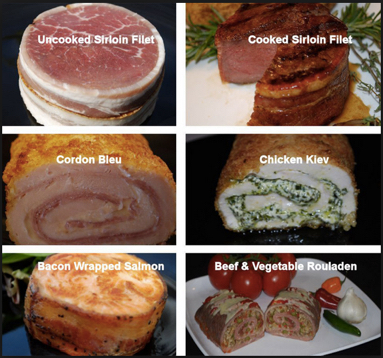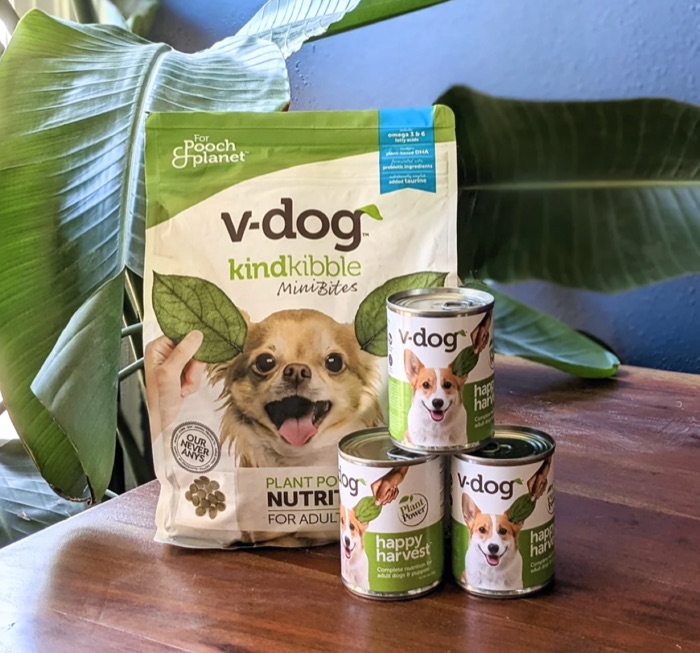
Just when you thought it was safe to go back into the supermarket, meet Meat Glue. Just what is Meat Glue? Meat Glue’s chemical name is transglutaminase, and it is sold under the brand names Activa and Moo Glue. Activa is a product of the Ajinomoto corporation, and Moo Glue is Modernist Pantry’s private relabeling of Activa. In other words, nearly all, if not all, meat glue comes from Ajinomoto.
🐶 HEY! WE GOT YOU 10% OFF ALL V-DOG VEGAN DOG FOOD AND TREATS!🐾
NO EMAIL ADDRESS NEEDED!
Just use our special coupon code HAPPYGFVEGAN at the V-Dog website!
Meat Glue is used to bind other types of proteins together, allowing food producers to re-shape, combine, and perform other manipulations to, typically, meat products (hence “meat glue”). For example it is used to form nuggets, to create fake crab legs and scallops, etc.. As the Protein Data Bank (PDB) branch of the Research Collaboratory for Structural Bioinformatics (RCSB) explains, “Tissue transglutaminase staples proteins together by forming a chemical crosslink.”
And, it is used to increase the yields in tofu and, we have read, has been used to make cream seem ‘creamier’, in eggs, etc..
The problem for vegetarians and vegans is that it is often made from the blood of pigs and cows.
Thank you! ❤️
*Receipts will come from ISIPP.
Let us repeat that: it is made from the blood of pigs and cows
Now, it is possible to make a microbial transglutaminase (much like it is possible to have a microbial rennet), but the issue is that not only don’t manufacturers have to say whether they are using a microbial versus blood plasma form of transglutaminase – they don’t have to disclose that they are using transglutaminase at all!
Even if you aren’t vegetarian or vegan, meat glue can cause problems for you. In a study done by Dr. Aristo Vojdani (who has very impressive credentials: MSC and PhD in the field of Microbiology and Clinical Immunology, with post doctorate studies in tumor immunology at UCLA;professor of neural immunology at the Carrick Institute for Graduate Studies, adjunct professor at both the Department of Preventive Medicine at Loma Linda University and the National University of Health Sciences at the Lincoln College of Professional, and with more than 45 years of research which have resulted in the development of more than 400 antibody assays related to the role of environmental triggers in many autoimmune disorders), Dr. Vojdani found that people who had no adverse reaction to meat generally had an adverse reaction to meat that contained meat glue. In a lecture at Functional Medicine University, Dr. Vodani explains that he tested 288 individuals, and 9% reacted to meat without meat glue but about 28% reacted to meat containing meat glue, adding that “meat glue is everywhere in the restaurant and many products which we buy from supermarkets without realizing. So therefore please pay attention to what your patients are using and remove the meat glue from the diet of your patient as much as possible.”
Shaped Meat Products Containing Meat Glue

Of course, if you are reading this article, you are probably vegan, or at least vegetarian. So know that transglutaminase is used to increase tofu production yields, as well as to thicken eggs, to strengthen dough, and to thicken dairy products such as yogurt and cheese. Oh, and it’s also used in some cosmetics, according to TruthinAging.com. (If you are concerned about only buying cruelty-free and vegan cosmetics and skin care products, see our sister site, VegetarianBeautyProducts.com.)
In fact U.S. Patent #20090142449A1 patents a method for using transglutaminase in tofu to “improve the texture and elasticity of the tofu, so that soft or silken tofu is more resistant to mechanical abuse during food preparation, and firm tofu can be sliced.”
This patent is held by FenJin He, who was a founder of Nature’s Soy Inc., makers of, among other things, yes, tofu for both the consumer and restaurant industries (now this isn’t to say that they don’t use microbial transglutaminase, if they themselves use transglutaminase at all – we just can’t know).

Unfortunately, the only way you can know whether one of the ingredients in the products you are buying is transglutaminase – and whether it’s microbial or blood-derived – is by contacting the company and asking.
Or by making your food from scratch.
The Happy Gluten-Free Vegan is always free, always reader-supported. Your tips via CashApp, Venmo, or Paypal are appreciated. Receipts will come from ISIPP.






 Our recipe book contains 50 of our favorite recipes, all vegan, all gluten-free, instantly downloadable!
Our recipe book contains 50 of our favorite recipes, all vegan, all gluten-free, instantly downloadable!
Meat glue is NOT made from pigs blood. Check Kitchen Alchemy’s article entitled, “Stuck on you, with meat glue of course”. Check all references before making wild statements.
“The transglutaminase used in food is manufactured either from the blood clotting factors of animals like cows and pigs or bacteria derived from plant extracts.”
https://www.healthline.com/nutrition/transglutaminase#what-is-it
Parker is correct. The transglutaminase that Ajinomoto makes, sold as Activa and Moo Gloo, are from microbial sources NOT blood. There are, however, multiple varieties of the product. Activa/Moo Gloo GS has gelatin added. Activa/Moo Gloo RM has sodium caseinate added, which comes from milk.
Activa/Moo Gloo TI is vegan! Please edit this article to clarify.
Just another reason to eat whole food plant based vegan. Just the thought of meat glue, vegetarian or not, seriously makes my stomach turn.
Where did you get the information the majority of Transglutaminase is from animal base? Microbial is much cheaper and widely available. All my sources for industrial purposes in Europe are microbial, and I reckon some countries even forbid animal based Transglutaminase.
Hello, Anderson – things are very different in the U.S. than they are in the EU when it comes to these sorts of things:
https://www.healthline.com/nutrition/transglutaminase#what-is-it
According to Wikipedia, animal sourced transglutaminase was banned in the EU about 10 years ago; however, it has not been banned here in the U.S. :~( https://en.wikipedia.org/wiki/Transglutaminase
Your article stinks of click-bait. So, nobody has to disclose whether or not they put transglutaminase in anything? It’s made in Japan, I assume. The photos above of all the food but the tofu are meat products, but why not show us a few examples of alleged vegetarian products made with “meat glue”? What companies in the USA and abroad use it? After you drop a bomb about this ingredient causing auto-immune disorders, you tell doctors, “[P]ay attention to what your patients are using and remove the meat glue from the diet of your patient as much as possible.” HOW CAN DOCTORS REMOVE IT FROM THEIR PATIENTS’ DIETS IF NOBODY KNOWS IN WHICH PRODUCTS “MEAT GLUE” IS USED? Why the hell didn’t you put a little more effort in your research to discover WHO is using this ingredient? This is yellow journalism at its worst.
Dear Ms. Reed – we get that this information is very upsetting, but please reread the article carefully. The quote you are complaining about was not said by us, it is a direct quote from Professor Vojdani. It is impossible to learn who in the tofu world is using this because – as you yourself note – they do not have to list it in the ingredients. However, if you search for this information, you will find that we are the *only* place that has done enough research to discover that the founder of Nature’s Soy – a U.S., not Japanese, company – holds the patent for using transglutaminase in tofu, and in fact we do include a picture of the Nature’s Soy tofu products. Again, yes, this is upsetting, however we are not the enemy – our article has more information in it than just about any of the other coverage of this in the popular press.